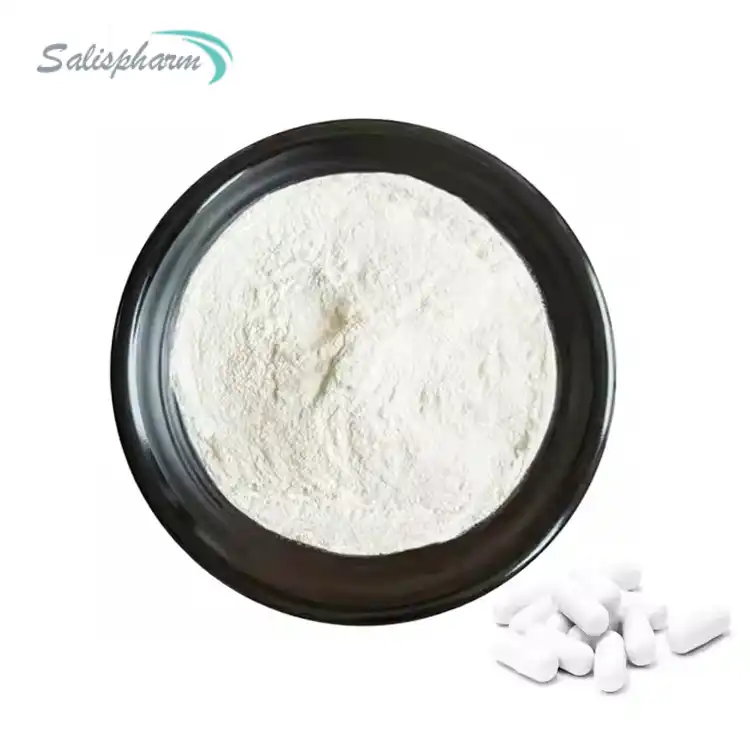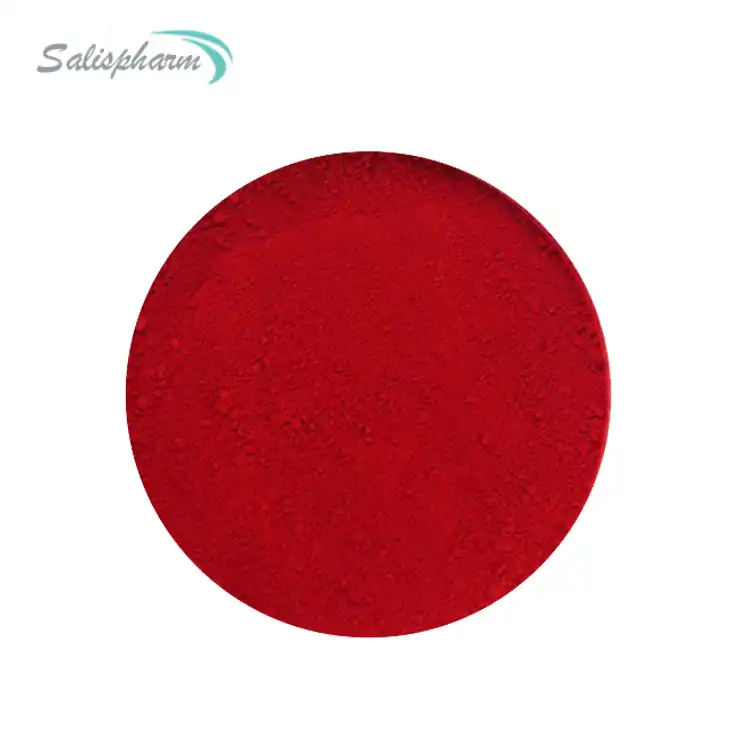Agomelatine is an innovative antidepressant that has gained attention in recent years for its unique mechanism of action in treating depression. Unlike traditional antidepressants that primarily target serotonin or norepinephrine, agomelatine works by modulating the circadian rhythm and melatonin system. This novel approach offers a promising alternative for individuals who may not respond well to conventional treatments or experience significant side effects. In this blog post, we'll explore the fascinating way agomelatine works to alleviate depressive symptoms and its potential benefits for patients struggling with this challenging mental health condition.
What is the mechanism of action of agomelatine powder?
Agomelatine powder, the active ingredient in the medication, operates through a dual mechanism of action that sets it apart from other antidepressants. Primarily, it acts as a melatonin receptor agonist and a serotonin receptor antagonist. This unique combination allows agomelatine to address both the mood and sleep disturbances commonly associated with depression.
At its core, agomelatine's mechanism involves:
1. Melatonin receptor activation: Agomelatine binds to and activates the MT1 and MT2 melatonin receptors in the brain. These receptors play a crucial role in regulating the body's circadian rhythm, also known as the sleep-wake cycle. By stimulating these receptors, agomelatine helps to normalize disrupted sleep patterns often experienced by individuals with depression.
2. Serotonin receptor blockade: Simultaneously, agomelatine acts as an antagonist at the 5-HT2C serotonin receptors. This blockade of 5-HT2C receptors leads to an increase in norepinephrine and dopamine release in the prefrontal cortex, a brain region heavily involved in mood regulation and cognitive function.
The combination of these actions results in several beneficial effects:
- Improved sleep quality: By enhancing melatonin signaling, agomelatine helps restore normal sleep patterns, addressing the insomnia or hypersomnia often associated with depression.
- Mood stabilization: The increased release of norepinephrine and dopamine in the prefrontal cortex contributes to improved mood and reduced depressive symptoms.
- Circadian rhythm regulation: Agomelatine helps resynchronize the body's internal clock, which can become disrupted in individuals with depression.
This unique mechanism of action offers several advantages over traditional antidepressants:
- Rapid onset of action: Many patients report improvements in sleep quality within the first week of treatment, with mood improvements following shortly after.
- Minimal sexual side effects: Unlike many SSRIs, agomelatine is associated with a lower incidence of sexual dysfunction, a common side effect that often leads to treatment discontinuation.
- Weight neutrality: Agomelatine is generally not associated with significant weight gain, another common concern with many antidepressants.
The dual action of agomelatine on both melatonin and serotonin systems provides a comprehensive approach to treating depression, addressing both the mood and sleep disturbances that often go hand-in-hand with the condition. This innovative mechanism has generated considerable interest in the psychiatric community and offers hope for patients who may not have found success with other treatment options.
How does agomelatine powder compare to other antidepressants in efficacy?
When evaluating the efficacy of agomelatine powder in comparison to other antidepressants, it's essential to consider both clinical trial data and real-world evidence. Numerous studies have been conducted to assess agomelatine's effectiveness in treating major depressive disorder (MDD) and its performance relative to established antidepressants.
Comparative efficacy studies have shown that agomelatine is generally as effective as other commonly prescribed antidepressants, including selective serotonin reuptake inhibitors (SSRIs) and serotonin-norepinephrine reuptake inhibitors (SNRIs). Several key points emerge from these comparisons:
1. Overall antidepressant effect: Multiple randomized controlled trials have demonstrated that agomelatine is significantly more effective than placebo in reducing depressive symptoms. Its efficacy is comparable to that of SSRIs like fluoxetine, sertraline, and escitalopram, as well as SNRIs like venlafaxine.
2. Rapid onset of action: One notable advantage of agomelatine is its relatively quick onset of action. Many patients report improvements in sleep quality within the first week of treatment, with mood improvements following shortly after. This rapid response can be particularly beneficial for patients in acute depressive episodes.
3. Sleep improvement: Agomelatine has shown superior efficacy in improving sleep quality compared to many other antidepressants. This is particularly important given that sleep disturbances are a common and distressing symptom of depression. The improvement in sleep often precedes and may contribute to the overall improvement in mood.
4. Anxiety symptoms: Depression and anxiety often co-occur, and agomelatine has demonstrated effectiveness in reducing anxiety symptoms associated with depression. Some studies suggest it may be particularly useful for patients with anxious depression.
5. Long-term efficacy: Studies examining the long-term use of agomelatine have shown that it maintains its antidepressant effect over extended periods, with a lower risk of relapse compared to placebo. This sustained efficacy is crucial for preventing the recurrence of depressive episodes.
6. Treatment-resistant depression: Some research suggests that agomelatine may be effective in patients who have not responded adequately to other antidepressants. Its unique mechanism of action makes it a valuable option for treatment-resistant cases.
While these comparisons generally favor agomelatine or show it to be at least as effective as other antidepressants, it's important to note that individual responses to antidepressants can vary greatly. What works well for one patient may not be as effective for another. The choice of antidepressant should always be made on an individual basis, considering the patient's specific symptoms, medical history, and potential drug interactions.
Moreover, the unique mechanism of action of agomelatine makes it a valuable addition to the antidepressant armamentarium, offering an alternative approach for patients who may not have responded well to or tolerated other medications. Its ability to address both mood and sleep disturbances simultaneously provides a comprehensive treatment approach that aligns well with the multifaceted nature of depression.
Can agomelatine powder be used for other mental health conditions besides depression?
While agomelatine powder is primarily known for its efficacy in treating major depressive disorder, research has explored its potential applications in other mental health conditions. The unique mechanism of action of agomelatine, which involves modulation of both the melatonin and serotonin systems, makes it a promising candidate for various psychiatric and neurological disorders. Here's an overview of the potential uses of agomelatine beyond depression:
1. Generalized Anxiety Disorder (GAD):
Several studies have investigated the use of agomelatine in treating GAD. The results have been encouraging, with agomelatine showing efficacy comparable to established anxiolytic medications. The drug's ability to improve sleep quality may be particularly beneficial for anxiety patients who often experience sleep disturbances.
2. Bipolar Disorder:
While caution is needed when using antidepressants in bipolar disorder due to the risk of inducing manic episodes, some research suggests that agomelatine may have a role in managing bipolar depression. Its mood-stabilizing effects and low risk of causing switches to mania make it an interesting option for further study in this population.
3. Seasonal Affective Disorder (SAD):
Given its effects on the circadian rhythm, agomelatine has shown particular promise in treating SAD. Its ability to regulate the sleep-wake cycle aligns well with the underlying mechanisms of this condition, potentially offering a targeted approach to treatment.
4. Obsessive-Compulsive Disorder (OCD):
Preliminary studies have explored the use of agomelatine in OCD, either as monotherapy or as an augmentation strategy. While more research is needed, initial results suggest it may be beneficial for some patients, particularly those with comorbid depression or sleep disturbances.
5. Post-Traumatic Stress Disorder (PTSD):
The sleep-regulating properties of agomelatine make it an interesting candidate for treating PTSD, where sleep disturbances are common and often severe. Some case reports and small studies have shown promising results in reducing both PTSD symptoms and associated sleep problems.
6. Fibromyalgia:
Agomelatine has been investigated as a potential treatment for fibromyalgia, a condition often associated with sleep disturbances and mood changes. Its dual action on sleep and mood regulation could provide a comprehensive approach to managing this complex disorder.
7. Chronic Fatigue Syndrome:
The circadian rhythm-regulating effects of agomelatine have led to interest in its potential use for chronic fatigue syndrome. While research is still in early stages, its ability to improve sleep quality and daytime functioning could be beneficial for these patients.
8. Parkinson's Disease:
Depression and sleep disturbances are common in Parkinson's disease. Some studies have explored the use of agomelatine in this population, with promising results in improving both mood and sleep quality without exacerbating motor symptoms.
While these potential applications are promising, it's important to note that many of these uses are still being researched, and agomelatine is not yet approved for conditions other than major depressive disorder in most countries. The off-label use of agomelatine for these conditions should only be considered under close medical supervision and after careful evaluation of the individual patient's needs and risk factors.
The exploration of agomelatine's potential in these various conditions underscores the complex interplay between mood, sleep, and overall mental health. Its unique mechanism of action provides a novel approach to addressing the multifaceted nature of many psychiatric and neurological disorders. As research continues, agomelatine may emerge as a versatile tool in the treatment of a wide range of mental health conditions, offering hope to patients who may not have found relief with traditional treatment options.
In conclusion, while agomelatine powder has proven its efficacy in treating depression, its potential extends far beyond this primary indication. The ongoing research into its applications for various mental health conditions highlights the importance of continued exploration of novel treatment approaches in psychiatry. As our understanding of the complex mechanisms underlying mental health disorders grows, medications like agomelatine that target multiple systems simultaneously may play an increasingly important role in providing comprehensive and effective treatment options for patients.
If you are also interested in this product and want to know more product details, or want to know about other related products, please feel free to contact iceyqiang@aliyun.com.
References:
1. de Bodinat, C., et al. (2010). Agomelatine, the first melatonergic antidepressant: discovery, characterization and development. Nature Reviews Drug Discovery, 9(8), 628-642.
2. Kasper, S., et al. (2010). Efficacy of the novel antidepressant agomelatine on the circadian rest-activity cycle and depressive and anxiety symptoms in patients with major depressive disorder: a randomized, double-blind comparison with sertraline. Journal of Clinical Psychiatry, 71(2), 109-120.
3. Taylor, D., et al. (2014). Antidepressant efficacy of agomelatine: meta-analysis of published and unpublished studies. BMJ, 348, g1888.
4. Fountoulakis, K. N., et al. (2011). Efficacy of antidepressants in the treatment of the depressive spectrum: a review. Current Neuropharmacology, 9(1), 163-180.
5. Srinivasan, V., et al. (2012). Agomelatine in depressive disorders: its novel mechanisms of action. Journal of Neuropsychiatry and Clinical Neurosciences, 24(3), 290-308.
6. Goodwin, G. M., et al. (2009). Agomelatine prevents relapse in patients with major depressive disorder without evidence of a discontinuation syndrome: a 24-week randomized, double-blind, placebo-controlled trial. Journal of Clinical Psychiatry, 70(8), 1128-1137.
7. Stein, D. J., et al. (2012). Agomelatine in generalized anxiety disorder: an active comparator and placebo-controlled study. Journal of Clinical Psychiatry, 73(7), 1003-1010.
8. Fornaro, M., et al. (2014). A systematic, updated review on the antidepressant agomelatine focusing on its melatonergic modulation. Current Neuropharmacology, 12(5), 426-445.
9. Cardinali, D. P., et al. (2012). Agomelatine: its role in the management of major depressive disorder. Clinical Medicine Insights: Psychiatry, 4, 1-23.
10. Norman, T. R., & Olver, J. S. (2019). Agomelatine for depression: expanding the horizons? Expert Opinion on Pharmacotherapy, 20(6), 647-656.










